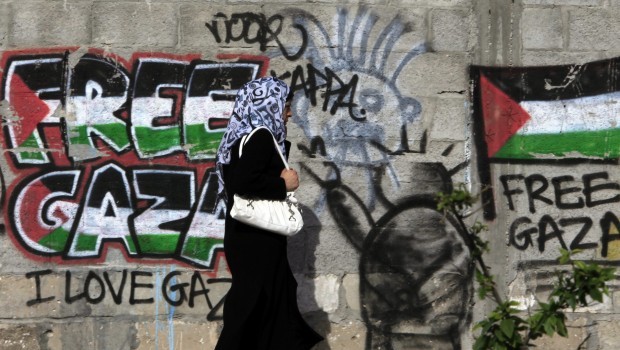
A Palestinian woman walks past a mural with text ‘Free Gaza’ in Gaza City, March 7, 2013. The two largest Palestinian groups have been at loggerheads for years despite mediation attempts by Egypt and other Arab countries. (EPA)
Gaza, Asharq Al-Awsat—Informed Palestinian sources have reported that the Egyptian General Intelligence Service has begun to make contact with the leaderships of Fatah and Hamas as a prelude to the resumption of dialogue between the two sides.
Sources told Asharq Al-Awsat that the latest Egyptian move comes within the context of applying the recommendations of the recent Arab League summit in Doha. At the meeting, it was decided that a joint Arab League committee will hold meetings in Cairo in April to discuss opportunities to achieve Palestinian reconciliation. The sources pointed out that the Egyptian side wants to reduce the rifts between Fatah and Hamas with regards to everything currently preventing a major reconciliation. In particular, they hope to address the formation of a national accord government, the reform of the Palestinian Liberation Organization (PLO), and the rebuilding of the Palestinian security apparatus. However, regardless of the efforts undertaken by Arab governments, there is no indication of willingness by either Hamas or Fatah to retreat on their prior positions with regards to contentious issues.
The sources explained that Palestinian President Mahmoud Abbas has so far insisted that there should be legislative and presidential elections within three months of the formation of a national accord government, regardless of what has been achieved by then through dialogue to resolve other contentious issues. In contrast, Hamas, according to sources, still refuses to agree to hold legislative and presidential elections before all outstanding issues are resolved and an appropriate atmosphere is created in the West Bank for elections to be conducted.
According to the sources, Hamas insists that elections should only be held under what it calls “healthy conditions.” These include the cessation of political arrests and the provision of opportunities for Hamas’s institutions, leaders and members to operate. The sources noted that Hamas has also called on President Abbas to provide international guarantees so that Israel cannot influence the movement’s ability to compete fairly in the West Bank.
For his part, Mahmoud Al-Aloul, a member of the Fatah Central Committee, accused Hamas of putting obstacles in the way of reconciliation. However, despite these remarks, he added that it is necessary to move forward and try to achieve reconciliation for the sake of the Palestinian people.
With regards to the killing of Egyptian soldiers near Rafah in 2012, which the Egyptian media accused Hamas of being responsible for, Aloul said that his movement clearly supports the official Egyptian position. He explained that Fatah cannot allow or support any Palestinian interference in Egyptian affairs.
In related news, a prominent Fatah MP has criticized calls to cut the salaries of military personnel in the Gaza Strip who are paid by the Ramallah government. A former member of the Palestinian Legislative Council and current coordinator of the Coalition for Accountability and Integrity, Azmi Shuaibi, previously called for the salaries of military personnel in Gaza to be stopped because they are on strike. In response, Fatah MP Ahmed Abu Houli questioned whether Shuaibi’s remarks reflect “hateful racism and underlying animosity towards the Gaza Strip, or whether he is talking boldly and openly about a topic that has been discussed behind closed doors in some quarters, namely that the Gaza military staff are a burden to be gotten rid of.”
In a statement, Abu Houli said, “Shuaibi’s statement is part of an ongoing campaign targeting military employees in the Gaza Strip. It ignores all the previous decisions of the Palestinian government and its prime minister, Salam Fayyad, who are actively encouraging employees not to go to work.” Abu Houli also warned that those who do return to work are responsible for their own actions.
